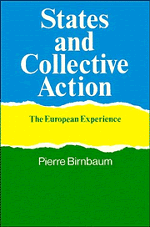Book contents
- Frontmatter
- Contents
- Acknowledgements
- Introduction
- 1 Mobilisation theory and the state: the missing element
- 2 States, free riders and collective movements
- 3 The state and mobilisation for war: the case of the French Revolution
- 4 Ideology, collective action and the state: Germany, England, France
- 5 Individual action, collective action and workers' strategy: the United States, Great Britain and France
- 6 The state versus corporatism: France and England
- 7 The Nazi collective movement against the Prussian state
- 8 Territorial and ethnic mobilisation in Scotland, Brittany and Catalonia
- 9 Nation, state and culture: the example of Zionism
- 10 The state, the police and the West Indians: collective movements in Great Britain
- Conclusion: the end of the state? From differentiation to dedifferentiation
- Notes
- Index
9 - Nation, state and culture: the example of Zionism
Published online by Cambridge University Press: 04 August 2010
- Frontmatter
- Contents
- Acknowledgements
- Introduction
- 1 Mobilisation theory and the state: the missing element
- 2 States, free riders and collective movements
- 3 The state and mobilisation for war: the case of the French Revolution
- 4 Ideology, collective action and the state: Germany, England, France
- 5 Individual action, collective action and workers' strategy: the United States, Great Britain and France
- 6 The state versus corporatism: France and England
- 7 The Nazi collective movement against the Prussian state
- 8 Territorial and ethnic mobilisation in Scotland, Brittany and Catalonia
- 9 Nation, state and culture: the example of Zionism
- 10 The state, the police and the West Indians: collective movements in Great Britain
- Conclusion: the end of the state? From differentiation to dedifferentiation
- Notes
- Index
Summary
Do the Jews constitute a people or a nation, and can they therefore have a state? This question, which remains, even after the creation of the state of Israel, a highly complex one, was still more so at the turn of the century, during the period when Zionism emerged and slowly took shape as a collective movement. It was in eastern Europe that Zionism made genuine advances, that is to say on the east of the conceptual map imagined by recent political sociologists, a zone where the state, because it was unable to differentiate itself from the landed aristocracy, could not be properly constituted. Power in these areas remained autocratic and no space for a state with universalist juridical boundaries could be cleared. A fortiori, no genuine ‘public space’ was created, such as would allow actors to have a voice and achieve a legitimate expression of their interests, which is as much as to say that, after the Bolshevik Revolution had taken place, the many social and nationalist mobilisations that then occurred did not have to confront an already established state, nor was there a genuine political market where they might express themselves. As a consequence, conflicting claims became confused and found expression, in a quite contradictory manner, at one and the same time, whereas in the West, where the state–citizenship dyad had long been established, the national framework existed in an embryonic form also, so that social conflicts unfolded within it.
- Type
- Chapter
- Information
- States and Collective ActionThe European Experience, pp. 156 - 169Publisher: Cambridge University PressPrint publication year: 1988



